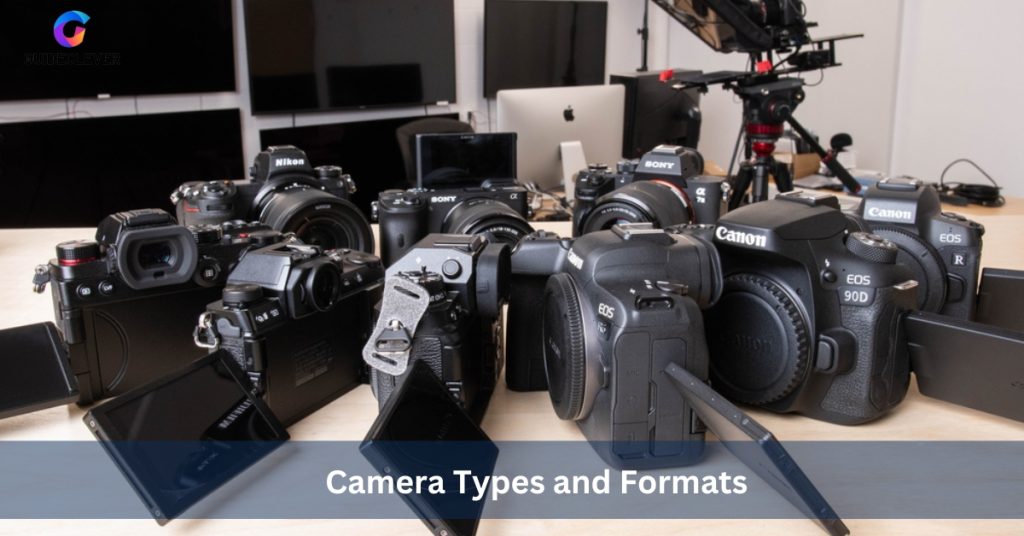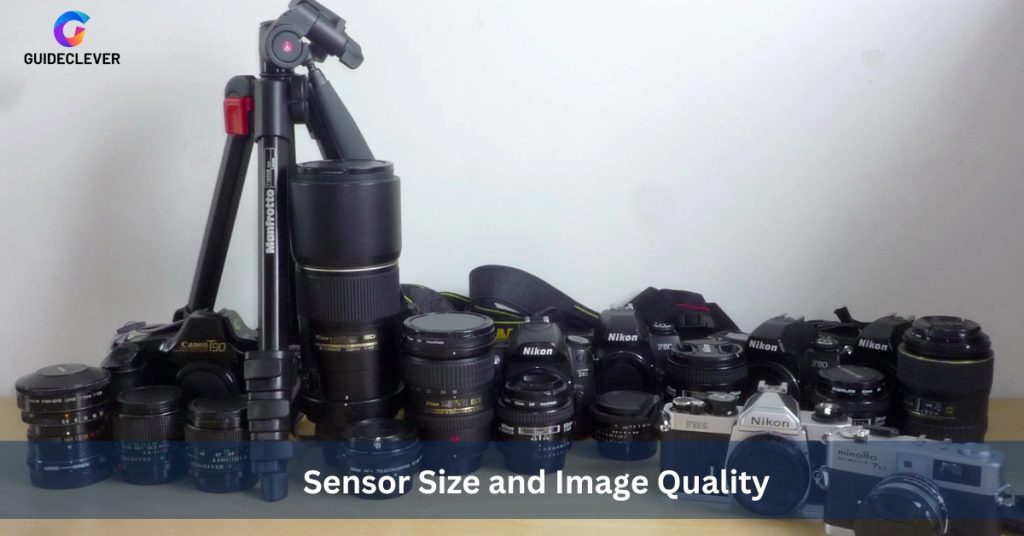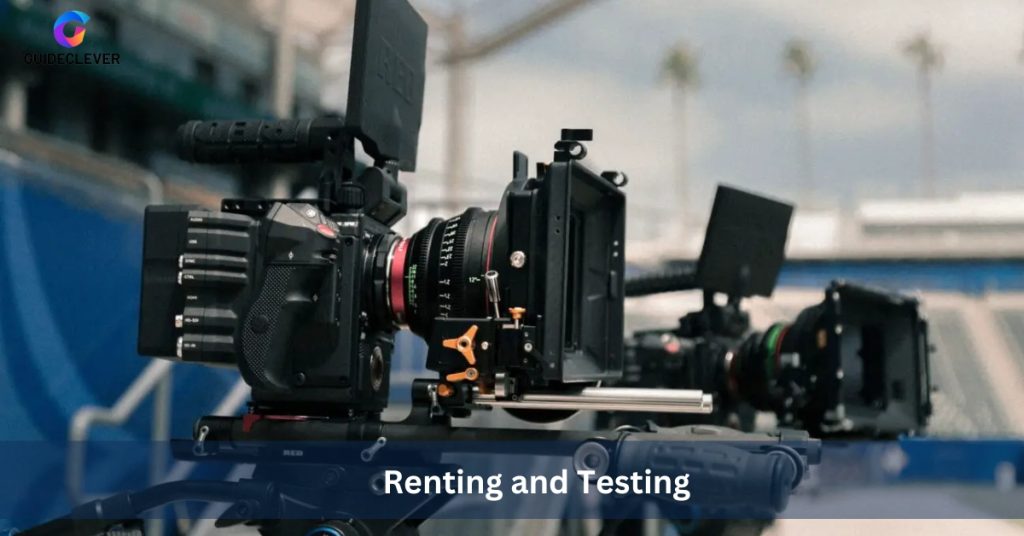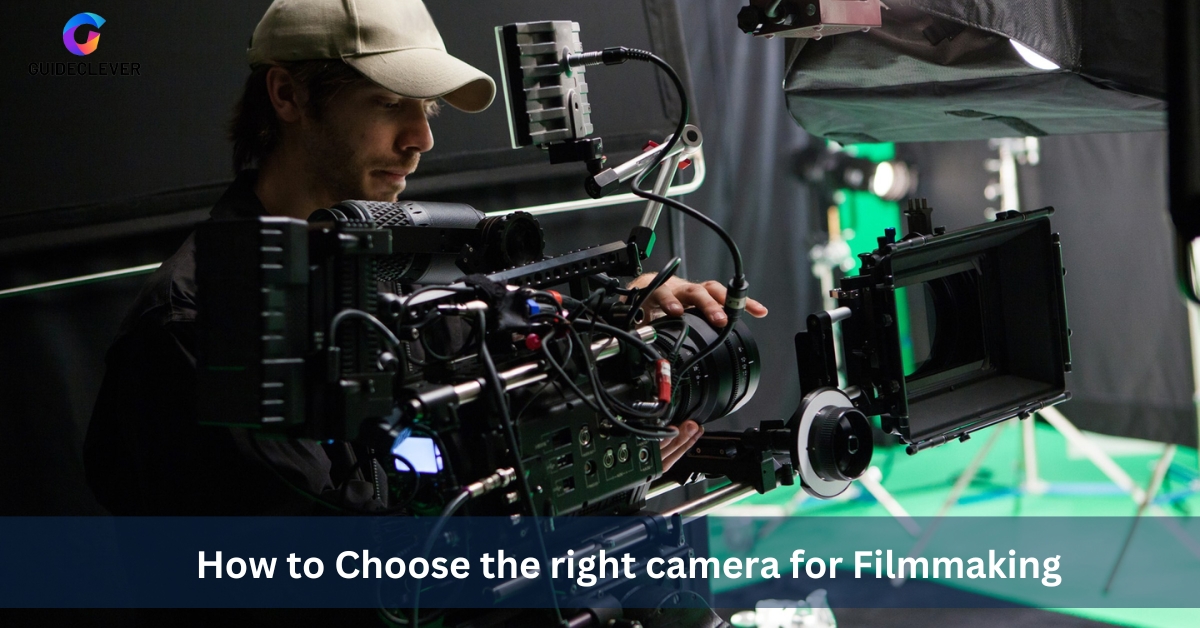Choosing a camera that can convey your vision on screen is crucial for a filmmaker. Making the ideal choice might be hard when there are so many options available. We’re pleased to offer detailed guidelines on choosing the right camera for filmmaking!
Don’t worry; we’ll offer you an overview of the vital things to consider. You can turn your dream into a reality by understanding how crucial it is to choose the right camera. We will cover costs, lens compatibility, image quality, and sensor. It will give you the ability to make a wise decision.
Let’s start this exciting journey of finding your ideal camera for filmmaking!
Contents
- 1 Understanding Filmmaking Needs
- 2 Budget Considerations
- 3 Camera Types and Formats
- 4 Sensor Size and Image Quality
- 5 Lens Compatibility and Flexibility
- 6 Video Features and Functionality
- 7 Camera Handling and Ergonomics
- 8 Post-production Workflow
- 9 User Reviews and Recommendations
- 10 Renting and Testing
- 11 FAQ
- 12 Conclusion
Understanding Filmmaking Needs
It is crucial to understand your goals and style while choosing a camera for filmmaking. Take a moment to think about the type of projects you’ll work on. Will you create narrative stories, documentaries, or music videos? Each class requires different visuals and technical features. By selecting your specific filmmaking needs, you can narrow down your choices. Look for a camera that matches your artistic vision. Remember, the camera you choose should be a tool that helps you to bring your ideas to life.
Budget Considerations
When you’re picking a camera for filmmaking, your budget is essential. Decide on a reasonable amount to spend on your photography equipment. Identify your financial limits. Keep in mind that you should balance the pricing with the features and quality you need. Choosing the most costly camera could seem alluring. Still, there can be cheaper, superior alternatives. You should consider the components that are essential to your projects. Try to choose an affordable camera that can still take pictures with good quality. Use all your available tools to complete your filming tasks.
Camera Types and Formats

First, it is important to understand the different types of cameras and video formats. Then you select the right one that meets your filmmaking needs.
- DSLR cameras are versatile and popular. They offer a wide range of features and are suitable for both still and video shooting.
- Mirrorless cameras are smaller and lighter than DSLRs. And they often have more advanced features.
- Cinema cameras are designed for professional filmmaking. They offer high image quality and are often used for high-end productions.
- Video formats determine the quality and size of your footage. The resolution of a video determines how clear and detailed it is. The codec of a video determines how much it is compressed, which affects its quality and file size.
Sensor Size and Image Quality

It is a must to consider the following features when choosing a camera for filmmaking:
Sensor size: Larger sensors capture more light, improving the quality of the images.
Performance in low light: It is essential for photography in gloomy conditions. Select a camera that performs well in low light. Even in low light, this will generate clear, noise-free video.
Dynamic range: The ability of the camera to catch a variety of tones, from shadows to highlights, is known as dynamic range. A camera with a high dynamic range will be able to capture detail in a scene’s highlights and shadows.
When choosing a camera, consider these criteria. And that will produce the best image quality for your filmmaking needs.
Lens Compatibility and Flexibility
When choosing a filmmaking camera, it’s essential to consider lens compatibility and flexibility. Different cameras have different lens mounts. So be sure to select right lenses that are consistent with your camera. It would be helpful if you also considered the lenses’ versatility.
Your creative options will increase if you use a variety of lenses. You can take close-ups, wide-angle photos, and photos with a shallow depth of focus using them. Start by assessing your needs. And then, choose lenses that will help you achieve your creative vision.
Video Features and Functionality
When choosing a camera for filmmaking, it’s essential to consider the video features and functionality. Check the frame rates, bit rates, and colour profiles. These factors affect the quality and flexibility of your footage.
Also, make sure the camera allows manual commands. It gives you control over exposure and focus settings. And check if the camera supports external monitoring. It lets you view footage on larger screens or professional monitors.
First, assess the video features and functionality. Then, make sure the camera provides the vital tools to support them. It will help you achieve the cinematic results you desire.
Camera Handling and Ergonomics
When choosing a camera for filmmaking, think about how comfortable it will be to use. A camera that feels good in your hands enhances your filmmaking experience. Assess the factors like size, weight, and ergonomics. Extra features like built-in stabilization and customizable controls can also improve usability. These features can make a big difference in your workflow and satisfaction.
By evaluating camera handling and ergonomics, you can achieve two things:
- Find a camera that meets your technical needs.
- Ensure a comfortable and efficient filming experience.
Post-production Workflow
When choosing a camera for filmmaking, think about how you will edit your footage. Make sure the camera’s file formats work with your editing software. It will make it easy to move from filming to editing without problems. Also, look for a camera that is easy to use in post-production. It means having menus that are easy to understand. And settings that you can customise to make editing easier. A camera that works well with your editing setup will save you time and let you focus on creating great videos.
User Reviews and Recommendations
When choosing a camera for filmmaking, read user reviews and ask for expert opinions. User reviews share real-world experiences. They bring up the pros and cons of different cameras. Learn about image quality, durability, ease of use, and performance. Both experienced filmmakers and professionals can also provide helpful advice. Their insights can help you narrow down your choices and find the perfect camera for your needs. Check user reviews and seek expert advice. Then make an informed decision and improve your filmmaking.
Renting and Testing

Rent cameras before you buy. It lets you try them out without spending a lot of money.
When you rent, you can test the cameras in real-world shooting situations. Consider image quality, low-light performance, autofocus, and user-friendliness.
Renting cameras helps you decide which model is right for you. It can save you money and help you avoid buying the wrong camera.
FAQ
Q: Is mirrorless better than a DSLR for video?
Mirrorless and DSLR cameras both have pros and cons for video recording. Mirrorless cameras offer advanced features. Such as 4K recording, higher frame rates, and better autofocus. They are also smaller and lighter, making them good for handheld or gimbal shooting. DSLRs can still be a good option if you have compatible lenses. The best camera for you depends on your needs, preferences, and budget.
Q: Which camera is best for video recording?
There are only a few perfect responses to this query. The ideal camera for capturing videos will depend on your needs, budget, and desired features. But the Sony A7S III, Panasonic Lumix GH5, and Canon EOS R5 are a few well-liked options. These cameras offer the following:
- Top-notch image quality,
- Cutting-edge video functionality,
- Seamless performance.
They rival that of professional devices. It’s crucial to take into account your unique needs. Find the best camera for you by comparing various models later.
Q: Cheapest 4K camera for filmmaking
When choosing an affordable 4K camera for filmmaking, consider the following factors:
- Lens compatibility: Make sure the camera you choose is compatible with the lenses you already have or want to buy.
- Durability: If you plan on using your camera in harsh environments, choose a durable model.
- Ease of use: If you’re not a technical person, choose a camera that’s easy to use and has a user-friendly interface.
Some affordable 4K cameras that meet these criteria include the Panasonic Lumix G7, Sony Alpha a6300, Nikon and Canon EOS M50.
Conclusion
When choosing a right camera for filmmaking, there are many factors to consider. Think about image quality, low-light performance, autofocus, and user experience. Your budget and specific needs matter too. No two filmmakers are the same, so choose a camera that fits your creative vision.
To find the right camera, do your research. Read reviews, watch videos, and try out different cameras. Once you’ve narrowed your choices, you can buy or rent.
No matter how you get a camera, take your time and make an informed decision. With research, you can find the perfect camera to bring your filmmaking dreams to life.



1 thought on “Step-By-Step Guide- Choose The Right Camera For Filmmaking”